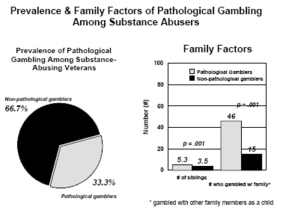A recent study conducted at a Veterans Affairs (VA) hospital sought to examine 1) the prevalence of pathological gambling among hospitalized substance-abusing patients, and 2) unique patterns of comorbidity among this population. The study included 276 (of 344 consecutively admitted patients) who agreed, within their first 3 days of hospitalization, to participate in the study. Using the South Oaks Gambling Screen to determine pathological gambling status, and the DSM-III-R to determine substance abuse status, researchers found 33% met criteria for both conditions. Several differences in substance use and family factors were found between subsets of pathological gamblers (SOGS >=5) and non-pathological gamblers (SOGS < 5), all of whom were substance abusers. Pathological gamblers had significantly larger families; in addition, over three times as many pathological gamblers as non-pathological gamblers reported having gambled with other family members as children. Pathological gamblers began using drugs at a significantly earlier age than non-pathological gamblers, and currently used alcohol significantly more days per month than non-pathological gamblers. Daghestani et al. (1996) suggest that their findings support the possibility of a common familial mechanism (social and/or biological) in both gambling and substance abuse. For example, alcohol could increase risk-taking behavior and decrease rational thinking; alternatively, gambling and alcohol use often occur concurrently in specific social settings. Further research is necessary to better understand these relationships.
Source: Daghestani, A.N., Elenz, E., & Crayton, J.W. (1996). Pathological gambling in hospitalized substance abusing veterans. Journal of Clinical Psychiatry, 57, 360-363.
This public education project is funded, in part, by The Andrews Foundation.
This fax may be copied without permission. Please cite The WAGER as the source.
For more information contact the Massachusetts Council on Compulsive Gambling,
190 High Street, Suite 6, Boston, MA 02110.





